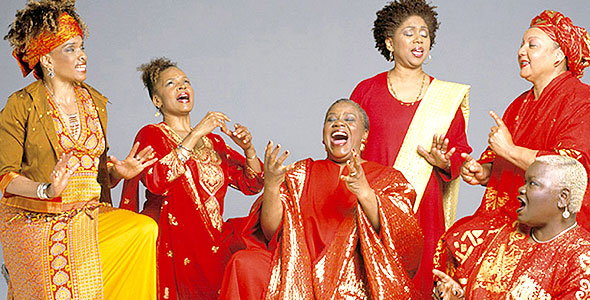By Fredara Mareva Hadley, Visiting Assistant Professor of Musicology, Oberlin College
[Editor’s Note: The following post is part of American Masters’ #InspiringWomanPBS campaign, which highlights the powerful, creative, and innovative women in our lives. Visit the Inspiring Woman page to join the campaign and submit the story of a woman who inspires you.]
The first and most essential instrument is the voice. While this instrument is something humans carry inside, it also reaches and resonates beyond our own bodies and beyond our individual lives. This is an important reminder when discussing the impact of the a cappella ensemble Sweet Honey in the Rock.
 Founded in 1973 by Dr. Bernice Johnson Reagon in Washington, D.C., Sweet Honey in the Rock has harnessed the power of Black women’s voices to carry messages of love, laughter, and life from inner cities to far-flung nations. Sweet Honey in the Rock is no mere “singing group” – they are an institution through which Black women virtuosos channel their own lives through their voices. Their voices help pull back the curtain on who we are.
Founded in 1973 by Dr. Bernice Johnson Reagon in Washington, D.C., Sweet Honey in the Rock has harnessed the power of Black women’s voices to carry messages of love, laughter, and life from inner cities to far-flung nations. Sweet Honey in the Rock is no mere “singing group” – they are an institution through which Black women virtuosos channel their own lives through their voices. Their voices help pull back the curtain on who we are.
I can’t remember the first time I saw Sweet Honey in the Rock perform, but I remember how they made me feel. I was in junior high school and remember becoming mesmerized by their dazzlingly colorful African garb and their melodiously resonant voices. I was born and raised in the South by Black women who were also born and raised in the South. What Sweet Honey in the Rock created onstage was a moment in which I heard the stories of the women of my family. Struggles for freedom, perseverance of humanity, and vicissitudes of love were united in spirit and melody.
The music of Sweet Honey in the Rock speaks to our soul
Sweet Honey in the Rock has traveled around this country and the world for nearly 45 years because its singers have the ability to create vibrations that reach our innermost selves. Everyone has loved and lost. Meditations such as “Breaths” and “Wanting Memories” touch the tender place within each of us that holds our sacred remembrances.
But its founder, Dr. Reagon, – and many of the nearly 20 Black women who have participated in Sweet Honey in the Rock – are activists and directly engaged in placing their hands in the soil of community work. So for Sweet Honey in the Rock, the soul is not just what lives within the individual; soul is also an entity that lives within community. Sweet Honey in the Rock provides us anthemic guidance as to how to live peaceably with each other.
Songs such as “Member of the World Community” remind the audience that a “neighbor” is not just someone with whom one shares a building or block, but instead anyone with whom we share space. This extends to all global neighbors with whom we share a responsibility for our collective well-being.
The music of Sweet Honey in the Rock isn’t just music of resistance — it’s music of insistence
Music of insistence works in tandem with music of resistance. The repertoire of Sweet Honey in the Rock exists to call her audience to resilience of individual and collective humanity. “Ella’s Song,” written by Reagon in honor of her mentor, civil rights activist Ella Baker, is a powerful song of insistence. The lyrics assertively proclaim the words of Baker who said, “We who believe in freedom cannot rest until it comes.”
But Sweet Honey in the Rock is no calcified relic. While they provide glimpses of what the contemplative heterophony of Negro Spirituals such as “Wade in the Water” and “Come by Hear” sounded like on American plantations, Sweet Honey in the Rock still surveys the present moment and responds to contemporary calls for love and justice. On their latest album, #LoveinEvolution, “Second Line Blues” is a poignant tribute to victims of gun violence, including police shootings. This is a call to insistence that we remember their names, and not just their deaths, but their humanity. The next song is a reinterpretation of Marvin Gaye’s “Wholy Holy” – an appeal for us to honor the best within ourselves to build a more unified world.
The impact and legacy of Sweet Honey in the Rock is measured in other ways. Vocal groups all over the world sing Sweet Honey in the Rock’s repertoire. Even I, as a graduate student, joined a Sweet Honey in the Rock-inspired women’s a cappella group called “AcaBella.”
Sweet Honey in the Rock’s impact is also seen in the number of women doing work that draws on the African American musical past while remaining grounded in the present. Choreographer and curator Rashida Bumbray, took the antebellum ring shout dance and collaborated with Grammy Award-winning rapper Common on his latest short film, Black America Again. The singer Imani Uzuri frequently channels the voices of ancestors in her performance of Negro Spirituals. She also founded the Revolutionary Choir that hearkens to Reagon’s days as a Freedom Singer and to the power of collective singing that Sweet Honey in the Rock brings to stages worldwide.
After 24 albums, two Grammy Awards, and nearly 45 years, Sweet Honey in the Rock still creates and performs music that speaks to the wellspring of our song and the insistence of our humanity.
Sweet Honey in the Rock is not just an institution. It is an enduring calling.
